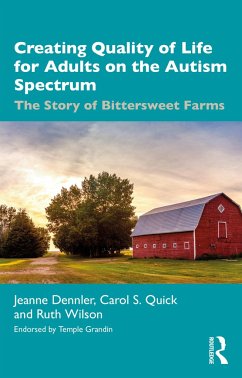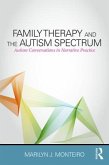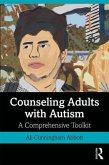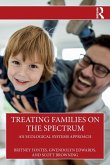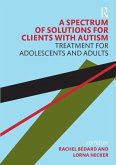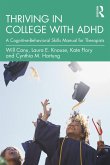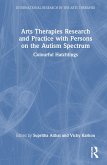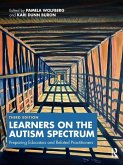Creating Quality of Life for Adults on the Autism Spectrum: The Story of Bittersweet Farms provides an overview of the first farmstead community for adults with autism established in North America. The book also provides a detailed description and evaluation of the intervention model used to promote quality of life for the adults with autism who live as residents at Bittersweet Farms.
Through its aim to provide a better understanding of adults with autism spectrum disorder (ASD), the text enables a deeper appreciation of the Bittersweet Farms model, which meets the residential and therapeutic needs of this population that are not often well understood. The book discusses the apprenticeship model used at Bittersweet Farms along with examples of how residents benefit from this approach. The text expands upon its approach through the inclusion of specific guidelines that can be adopted for improved communication and social interaction, managing troublesome behaviors, calming anxieties, and establishing daily routines. These guidelines reflect a positive approach to intervention and are consistent with the quality-of-life emphasis inherent in the Bittersweet model.
This book will serve as a seminal work for professionals and paraprofessionals working with people with ASD. It will further be of interest to parents and relatives of people with ASD along with researchers and policymakers concerned about the ASD adult population, and those interested in services for people with ASD.
Through its aim to provide a better understanding of adults with autism spectrum disorder (ASD), the text enables a deeper appreciation of the Bittersweet Farms model, which meets the residential and therapeutic needs of this population that are not often well understood. The book discusses the apprenticeship model used at Bittersweet Farms along with examples of how residents benefit from this approach. The text expands upon its approach through the inclusion of specific guidelines that can be adopted for improved communication and social interaction, managing troublesome behaviors, calming anxieties, and establishing daily routines. These guidelines reflect a positive approach to intervention and are consistent with the quality-of-life emphasis inherent in the Bittersweet model.
This book will serve as a seminal work for professionals and paraprofessionals working with people with ASD. It will further be of interest to parents and relatives of people with ASD along with researchers and policymakers concerned about the ASD adult population, and those interested in services for people with ASD.
"The Bittersweet Farm Model is really effective for individuals with severe sensory problems, aggressive behavior, and intellectual disability. The emphasis on farm life, sensory rich activity, and physical labor is calming."
Temple Grandin, Author, The Autistic Brain
____________________________________________________________________________________
"While many have elected to live and work in rural America, the options for adults with autism to pursue a similar lifestyle were nearly nonexistent. Yet, the pleasures of working the land, caring for animals, and appreciating the change of seasons can become the backdrop for supporting and engaging everyone, including those with autism.
Bittersweet began as a dream. It is a dream shared by many families, but few have succeeded at making that dream a reality. As adults with autism have struggled to find homes and communities that recognize their unique perspective and contributions, the founders of Bittersweet unified a collection of leaders and resources to find creative solutions. Individuals with autism, families and professionals will each find something in the Bittersweet vision. Learn from their journey and pick up valuable practical examples by reading this book."
Steven Muller, CEO, Balance Autism
____________________________________________________________
"As the grandfather of two young adults with autism, I found this book really valuable -- a must read to learn how to help provide meaning and purpose to those on the spectrum..and to benefit yourself from a loving relationship."
Bill Novelli, Professor, McDonough School of Business, Georgetown University and former CEO, AARP
____________________________________________________
"Bittersweet Farms is widely admired for the quality and depth of their programs that embrace individuality. This book provides valuable insight into creating a purposeful community where adults with autism can live, work and flourish."
Ashley Kim Weiss, Executive director for Together For Choice, an advocacy organization aimed at promoting the spectrum of housing/service models for people with autism and other developmental disabilities.
__________________________________________________
"Bittersweet represents the ideal autism service provider. Their personalized, respectful approach focuses on functional meaningful activities in a natural environment. Both on the farm and within the larger community, Bittersweet offers its participants acceptance, purpose and belonging. It is exactly what this doctor recommends!"
Karen Ratliff-Schaub, MD, MBOE, Medical Director, Developmental Pediatrics, Program Director, Developmental Behavioral Pediatric fellowship
Prisma Health Children's Hospital-Upstate
200 A Patewood Drive
Greenville, SC 29615
864-454-5115 (office)
864-454-5110 (fax)
____________________________________________
"I am happy to support this book describing the Bittersweet Farms model for meeting the complex needs of adults with autism. The book clearly outlines the benefits of care farming for adults with disabilities and is sure to be an invaluable guide for programs in other communities. As a parent of a young adult with autism spectrum disorder and as a director of a nature-based program for youth and
young adults with disabilities, I am aware of the benefits of farming and nature for all, but particularly for people with differing abilities."
Lisa Burris, Executive Director, Turn Back Time (a farm and nature-focused program for children in Paxton, Massachusetts)
https://tbtinc.org/
__________________________________________________________
"From its inception, Bittersweet Farms was envisioned as a therapeutic community where those with autism could continue to grow and flourish as adults. Those of us on staff and the families knew it succeeded in providing that and more. A good quality of life was always the goal, individualized for each person. Until Dr. Dennler took on the project of analyzing and evaluating data and other aspects of the residents' lives, we did not have the empirical evidence to validate what we knew intuitively. Professionals and families traveled to Bittersweet from all over the world, seeking to understand how to replicate a program that would accomplish this goal. Now with this book, many more can understand the concepts Bittersweet was built on."
Vickie Obee, Former Director of Bittersweet Farms
__________________________________________________________
"Bittersweet Farms represents a rare and important resource to people interested in understanding the experiences of a diverse group of autistic adults across the lifespan. Only a few service providers in the world have focused exclusively on the autistic adult population for as long as Bittersweet: nearly 40 years of developing and refining autism informed programs of support and life enrichment.
The autistic men and women of Bittersweet range from young adults to seniors. Their support needs are moderate through intense. Their backgrounds are diverse. They came to Bittersweet from family homes, group homes, state institutions, and independent living settings, all unable to help them lead happy, safe, and fulfilling lives. But each found support, and thrived, at Bittersweet. It's an amazing success story. The terrific autistic adults you'll learn about have much to teach the world, as do Bittersweet's leaders and staff, both past and present. I hope you'll join me in reading Dr. Jeanne Dennler's in-depth exploration of Bittersweet Farms.
Every year, people from around the country and world travel to Bittersweet in Whitehouse, Ohio (just outside Toledo) to learn about the holistic and healthy work/live model that this intentional community embraces. Many arrive with the idea of replicating the Bittersweet model close to home. Some start by saying, "I found this beautiful farm..." But most discover that reproducing Bittersweet involves far more than acquiring an idyllic farm. Rather, it's the relationship between the holistic support model and setting that's the secret to Bittersweet's success. Bittersweet is not isolated. The people, both residents and staff, and their farm operations, which include a community supported agricultural (CSA) program, are all strongly, and undeniably, woven into the fabric of their broader community.
In recent years, spurred on by the landmark United States Supreme Court Olmstead decision and state-based deinstitutionalization efforts, elected officials, public policy makers, advocacy organizations, families, and advocates, including self-advocates, have been engaged in a welcome effort to restructure the system of supports and services for intellectual and developmentally disabled Americans, including autistic adults. This restructuring, sometimes referred to as rebalancing, prioritizes the development and funding of integrated community-based service and support infrastructure over historic, large scale congregate care models.
The founder of Bittersweet Farms, Bettye Ruth Kay, a progressive special education teacher in the Toledo, Ohio school system, knew that the archaic institutional system was poorly designed for autistic adults. She saw the bleak, and dangerous, future of institutional placement that awaited many of her students after they aged out of school-based entitlements. Ms. Kay created and developed Bittersweet as an alternative to segregated, large scale institutional congregate care models, which included involuntary, rural, state-run industrial farms for intellectual and developmentally disabled adults. Her vision was to help "autistic people (grow) in every area of life, using the rural, extended family community as the model."
Sadly, some leading disability rights advocates insist on conflating Bittersweet, and similar voluntary intentional community models, with large, involuntary 19th century institutions, despite overwhelming evidence to the contrary. Unfortunately, this inaccurate and unfair notion has created policy and economic barriers to the replication of Bittersweet's inclusive model, though some notable exceptions do exist. I hope that Dr. Dennler's work helps correct this unfair narrative, so that the thousands of autistic adults who want a holistic provider model and supportive community like Bittersweet can enjoy the same positive outcomes and life experiences that you'll learn about in this book."
- Gene Bensinger
Gene Bensinger is a Managing Director in Institutional Sales at Mesirow Financial, a diversified financial services firm headquartered in Chicago. Gene has been a leading national advocate on a wide range of autism related issues for over 20 years.
Gene helped lead the successful coalition based effort to enact autism insurance reform in Illinois from 2004-7. In 2008, he helped create, and served on the Advisory Committee for, the Autism Speaks Autism Safety Project. Gene also participated in President Barack Obama's inaugural White House Conference on Autism in 2011. From 2014-17, Gene worked with a bipartisan coalition of legislators to help create landmark ABLE Savings Plans, which are similar to college savings plans for people with a wide range of disabilities who meet certain qualifications.
Currently, Gene is working closely with national, state, and local policy makers, advocates, and elected officials on autism related policy and legislation around the issues of housing, employment, safety, adult supports and services, and financial security. He regularly speaks on these topics to groups at conferences and events.
Gene formerly served on the Autism Speaks Chicagoland Chapter Board. Gene and his wife, Lynn Straus, live in Chicago and have two adult sons, the eldest of whom is profoundly autistic.
Temple Grandin, Author, The Autistic Brain
____________________________________________________________________________________
"While many have elected to live and work in rural America, the options for adults with autism to pursue a similar lifestyle were nearly nonexistent. Yet, the pleasures of working the land, caring for animals, and appreciating the change of seasons can become the backdrop for supporting and engaging everyone, including those with autism.
Bittersweet began as a dream. It is a dream shared by many families, but few have succeeded at making that dream a reality. As adults with autism have struggled to find homes and communities that recognize their unique perspective and contributions, the founders of Bittersweet unified a collection of leaders and resources to find creative solutions. Individuals with autism, families and professionals will each find something in the Bittersweet vision. Learn from their journey and pick up valuable practical examples by reading this book."
Steven Muller, CEO, Balance Autism
____________________________________________________________
"As the grandfather of two young adults with autism, I found this book really valuable -- a must read to learn how to help provide meaning and purpose to those on the spectrum..and to benefit yourself from a loving relationship."
Bill Novelli, Professor, McDonough School of Business, Georgetown University and former CEO, AARP
____________________________________________________
"Bittersweet Farms is widely admired for the quality and depth of their programs that embrace individuality. This book provides valuable insight into creating a purposeful community where adults with autism can live, work and flourish."
Ashley Kim Weiss, Executive director for Together For Choice, an advocacy organization aimed at promoting the spectrum of housing/service models for people with autism and other developmental disabilities.
__________________________________________________
"Bittersweet represents the ideal autism service provider. Their personalized, respectful approach focuses on functional meaningful activities in a natural environment. Both on the farm and within the larger community, Bittersweet offers its participants acceptance, purpose and belonging. It is exactly what this doctor recommends!"
Karen Ratliff-Schaub, MD, MBOE, Medical Director, Developmental Pediatrics, Program Director, Developmental Behavioral Pediatric fellowship
Prisma Health Children's Hospital-Upstate
200 A Patewood Drive
Greenville, SC 29615
864-454-5115 (office)
864-454-5110 (fax)
____________________________________________
"I am happy to support this book describing the Bittersweet Farms model for meeting the complex needs of adults with autism. The book clearly outlines the benefits of care farming for adults with disabilities and is sure to be an invaluable guide for programs in other communities. As a parent of a young adult with autism spectrum disorder and as a director of a nature-based program for youth and
young adults with disabilities, I am aware of the benefits of farming and nature for all, but particularly for people with differing abilities."
Lisa Burris, Executive Director, Turn Back Time (a farm and nature-focused program for children in Paxton, Massachusetts)
https://tbtinc.org/
__________________________________________________________
"From its inception, Bittersweet Farms was envisioned as a therapeutic community where those with autism could continue to grow and flourish as adults. Those of us on staff and the families knew it succeeded in providing that and more. A good quality of life was always the goal, individualized for each person. Until Dr. Dennler took on the project of analyzing and evaluating data and other aspects of the residents' lives, we did not have the empirical evidence to validate what we knew intuitively. Professionals and families traveled to Bittersweet from all over the world, seeking to understand how to replicate a program that would accomplish this goal. Now with this book, many more can understand the concepts Bittersweet was built on."
Vickie Obee, Former Director of Bittersweet Farms
__________________________________________________________
"Bittersweet Farms represents a rare and important resource to people interested in understanding the experiences of a diverse group of autistic adults across the lifespan. Only a few service providers in the world have focused exclusively on the autistic adult population for as long as Bittersweet: nearly 40 years of developing and refining autism informed programs of support and life enrichment.
The autistic men and women of Bittersweet range from young adults to seniors. Their support needs are moderate through intense. Their backgrounds are diverse. They came to Bittersweet from family homes, group homes, state institutions, and independent living settings, all unable to help them lead happy, safe, and fulfilling lives. But each found support, and thrived, at Bittersweet. It's an amazing success story. The terrific autistic adults you'll learn about have much to teach the world, as do Bittersweet's leaders and staff, both past and present. I hope you'll join me in reading Dr. Jeanne Dennler's in-depth exploration of Bittersweet Farms.
Every year, people from around the country and world travel to Bittersweet in Whitehouse, Ohio (just outside Toledo) to learn about the holistic and healthy work/live model that this intentional community embraces. Many arrive with the idea of replicating the Bittersweet model close to home. Some start by saying, "I found this beautiful farm..." But most discover that reproducing Bittersweet involves far more than acquiring an idyllic farm. Rather, it's the relationship between the holistic support model and setting that's the secret to Bittersweet's success. Bittersweet is not isolated. The people, both residents and staff, and their farm operations, which include a community supported agricultural (CSA) program, are all strongly, and undeniably, woven into the fabric of their broader community.
In recent years, spurred on by the landmark United States Supreme Court Olmstead decision and state-based deinstitutionalization efforts, elected officials, public policy makers, advocacy organizations, families, and advocates, including self-advocates, have been engaged in a welcome effort to restructure the system of supports and services for intellectual and developmentally disabled Americans, including autistic adults. This restructuring, sometimes referred to as rebalancing, prioritizes the development and funding of integrated community-based service and support infrastructure over historic, large scale congregate care models.
The founder of Bittersweet Farms, Bettye Ruth Kay, a progressive special education teacher in the Toledo, Ohio school system, knew that the archaic institutional system was poorly designed for autistic adults. She saw the bleak, and dangerous, future of institutional placement that awaited many of her students after they aged out of school-based entitlements. Ms. Kay created and developed Bittersweet as an alternative to segregated, large scale institutional congregate care models, which included involuntary, rural, state-run industrial farms for intellectual and developmentally disabled adults. Her vision was to help "autistic people (grow) in every area of life, using the rural, extended family community as the model."
Sadly, some leading disability rights advocates insist on conflating Bittersweet, and similar voluntary intentional community models, with large, involuntary 19th century institutions, despite overwhelming evidence to the contrary. Unfortunately, this inaccurate and unfair notion has created policy and economic barriers to the replication of Bittersweet's inclusive model, though some notable exceptions do exist. I hope that Dr. Dennler's work helps correct this unfair narrative, so that the thousands of autistic adults who want a holistic provider model and supportive community like Bittersweet can enjoy the same positive outcomes and life experiences that you'll learn about in this book."
- Gene Bensinger
Gene Bensinger is a Managing Director in Institutional Sales at Mesirow Financial, a diversified financial services firm headquartered in Chicago. Gene has been a leading national advocate on a wide range of autism related issues for over 20 years.
Gene helped lead the successful coalition based effort to enact autism insurance reform in Illinois from 2004-7. In 2008, he helped create, and served on the Advisory Committee for, the Autism Speaks Autism Safety Project. Gene also participated in President Barack Obama's inaugural White House Conference on Autism in 2011. From 2014-17, Gene worked with a bipartisan coalition of legislators to help create landmark ABLE Savings Plans, which are similar to college savings plans for people with a wide range of disabilities who meet certain qualifications.
Currently, Gene is working closely with national, state, and local policy makers, advocates, and elected officials on autism related policy and legislation around the issues of housing, employment, safety, adult supports and services, and financial security. He regularly speaks on these topics to groups at conferences and events.
Gene formerly served on the Autism Speaks Chicagoland Chapter Board. Gene and his wife, Lynn Straus, live in Chicago and have two adult sons, the eldest of whom is profoundly autistic.

